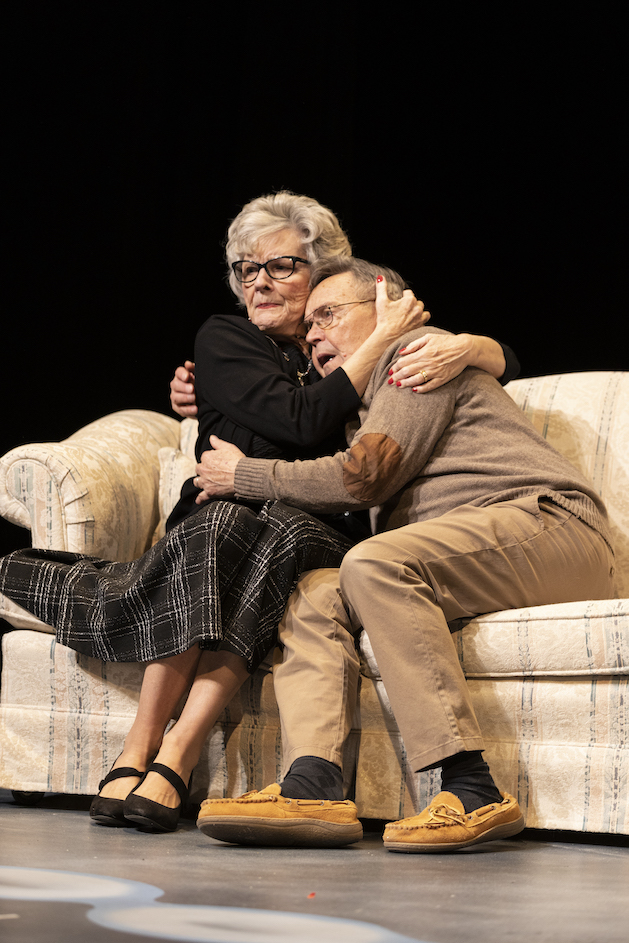
This is heartbreaking: Patti Allan and Tom McBeath in Instantaneous Blue.
(Image by Shimon Photo)
Aaron Craven’s new script Instantaneous Blue rings with the authority of personal experience. And director David Mackay is working with extraordinary actors. The play is moving. The production works. And, not to be a nerd or anything, but there are things to be learned here about structure.
Mitch and Murray Productions, the producing company, is billing Instantaneous Blue as a semi-autobiographical story. In 2016, both of playwright Craven’s parents were diagnosed with cognitive decline: Alzheimer’s and dementia. In the play, that’s what happens to Edward, who struggles with his new responsibilities to his parents, the shock of their transformations, the demands of his acting career and status as a new dad, and the temptation to take it all out on his wife.
Throughout Act 1, there are quiet moments of truth. As Judith and Bob, Edward’s mom and dad, are getting increasingly addled and anxious, music plays and they suddenly, instinctively gravitate to one another, embrace, and dance: for a moment at least, they’re safe. Edward is auditioning for a film role and he can’t remember his fucking lines: you can feel the floor falling away beneath him. And the look on Edward’s face as he watches paramedics forcibly restrain then sedate his raging mother is pure, silent tragedy. When Edward’s wife Sara finally speaks after being endlessly put down by Edward’s knee-jerk sarcasm, it’s a gut punch: “I want to tell you everything, my love,” she says.
You couldn’t ask for better actors. Charlie Gallant (Edward) has the gift of transparency. Patti Allan fearlessly drives the out-of-control car of Judith’s mood swings. And Tom McBeath brings touching delicacy to Bob’s attempts to make everything okay. The kindness, generosity, and unadorned sense of presence that actor Olivia Hutt brings to Sara grounds the evening.
That’s a lot to be grateful for — but Act 1 moved in fits and starts for me. That’s because, for all its honesty and intensity, there isn’t much progression. Craven tells us virtually nothing about the characters’ relationships before Judith and Bob started to fall off the edge, so we don’t know what’s being lost. And each of Craven’s characters gets into a single groove and pretty much stays there. Edward rages — a lot — which tips him towards being two-dimensional and off-putting. Sara is long-suffering, Judith disinhibited, Bob ameliorating.
There’s a principle in dramaturgy called the reversal of polarities: as the protagonist, which is Edward in this case, tries different strategies to get what he wants, he experiences a series of alternating successes and failures — or at least he should if you want to maintain dramatic tension and allow the audience to see how the character is learning. That doesn’t happen here — or at least not enough: Edward’s self-involved rage simply repeats. Because I didn’t get much of a sense of accumulating insight as I watched the first act of Instantaneous Blue, I felt more like I was witnessing a recounting of events than being engaged by a deeper thematic exploration.
That changed in Act 2. That’s because there are more changes in the story — in the progression of Judith and Bob’s illnesses, and, importantly, in Edward’s deepening understanding of how to address his parents’ needs and those of his wife.
Instantaneous Blue is always engaging, but it lands in Act 2.
Set designer David Roberts provides mostly naturalistic settings — a couple of living rooms, a hospital lounge — accented by a surreal image: on the back wall between the stage’s two main playing areas, he has placed the projection of an upside-down cherry tree in full bloom. The pink tree looks like a brain. As the story unfolds, the tree’s blossoms fall until, at the end of each act, its branches are bare.
INSTANTANEOUS BLUE by Aaron Craven. Directed by David Mackay. A Mitch and Murray Productions presentation at the Waterfront Theatre on Friday, January 6. Continues until January 22. Tickets
NEVER MISS A REVIEW: Sign up for FRESH SHEET, my weekly e-letter about the arts.
And, if you want to help to keep independent arts criticism alive in Vancouver, check out my Patreon page.





0 Comments